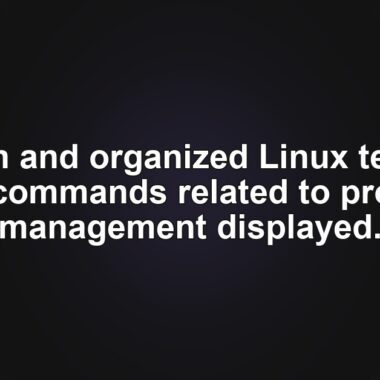![]()
16 VPS Security Tips to Protect Your Linux Server
Knowing how to secure your Linux virtual private server is important to avoid cyber threats. However, this is not a one-time task – in addition to applying the best security practices, you must always monitor your virtual private server (VPS).
In this article, we will dive deeper into Linux security and its common vulnerabilities. We will also discuss 16 VPS security tips to prevent cyber attacks on your virtual server.
Linux Security and Common Weaknesses
While Linux VPS security is generally robust, it does have some weaknesses. Many cyber threats can compromise your Linux server’s security and data. Here are the most common ones:
- Malware– intrusive software intentionally designed to harm computers and their operating systems. It comes in many forms, including Trojans, ransomware, viruses, and spyware.
- Sniffing attack– a cyber attack that happens when a hacker uses packet sniffers to intercept and extract data from a network.
- Brute-force attack– a hacking method involving an attacker who uses trial and error to guess login credentials.
- SQL injection– an attack that occurs when a hacker exploits code in a web application to gain access to the server’s database.
- Cross-site scripting (XSS)– a client-side attack during which a hacker injects malicious code into a website.
- No function-level control– when the access rights to a server aren’t verified properly, giving unauthorized users root privileges.
- Broken authentication– identity theft that happens due to unencrypted data, weak passwords, or poorly configured application session timeouts.
Before implementing any security measures, learn the crucial elements you should monitor in your virtual private server, which include:
- VPS hosting security
- Server software
- SSH connection
- Root access and logins
- Passwords and credentials
- Firewalls
- FTP connection
- User rights and privileges
- Server logs
16 VPS Security Tips to Protect Your Server Security
This section contains 16 security tips for preventing cyber attacks on VPS hosting.
1. Research your web hosting security
Your VPS hosting provider must have a strong security infrastructure and offer additional protection to keep your server safe. While users can install extra security features, some are pre-configured. Depending on the provider, the security features will differ.
Short Description:
- Comprehensive security practices for all virtual machine hosting plans
2. Change the default SSH port
If you still use port 22 to access your virtual server via an SSH connection, hacking attempts may be more likely. This is because attackers can scan open ports to perform brute-force attacks and obtain SSH access to the remote server.
Short Description:
- Change the default SSH listening port to protect your data against automated attacks
3. Disable root login
Linux VPS has a root user that possesses the most privileges on the operating system and can modify any aspect of the server. Cyber criminals might target this user to gain full access to the server.
Short Description:
- Deactivate the root account to improve root access security
4. Use strong passwords
Passwords containing information about your identity or simple passphrases are easy to guess. To prevent successful brute-force attacks, create a long and complicated password with several elements, such as numbers and special characters.
Short Description:
- Create long and complicated passwords with numbers and special characters
5. Start using SSH keys
If you’re only using a password to log in, you may become the target of sniffing attacks. To avoid this, use SSH keys instead of a password for VPS authentication.
Short Description:
- Use SSH keys for VPS authentication to avoid sniffing attacks
6. Setup an internal firewall (IP tables)
Since HTTP traffic has various origins, setting up a firewall for VPS helps filter the requests to ensure only legitimate visitors can access your system.
Short Description:
- Set up a firewall for VPS to filter incoming requests and protect against malicious traffic
7. Configure your UFW
The Uncomplicated Firewall (UFW) is a built-in application on Ubuntu that acts as the front end for iptables. Simply put, it will deny all incoming connections and allow outgoing ones, decreasing the risk of potential threats.
Short Description:
- Enable UFW to deny incoming connections and decrease the risk of potential threats
8. Using SFTP instead of FTP
While commonly used, the file transfer protocol (FTP) connection is unsafe due to the lack of encryption. Even though FTP over transport layer security (TLS) or FTPS encrypts the login credentials, it doesn’t secure the file transmission.
Short Description:
- Use secure file transfer protocol (SFTP) to encrypt all data, including credentials and transferred files
9. Set up Fail2Ban
The security software Fail2Ban monitors system logs and blocks hackers after multiple failed logins. In addition, it protects servers against DoS, DDoS, dictionary, and brute-force attacks.
Short Description:
- Set up Fail2Ban to block failed login attempts and protect against various attacks
10. Install an antivirus
In addition to setting up a firewall to filter incoming traffic, it’s important to monitor files in your VPS. Virus attacks are one of the main Linux server vulnerabilities, and they can potentially target your servers and damage your data.
Short Description:
- Install an antivirus to detect suspicious activity and quarantine unwanted files
11. Use a malware scanner
While an antivirus protects your VPS from threats like trojans and worms, it may be unable to detect newer exploits like zero-day malware.
Short Description:
- Use a malware scanner to detect newer threats on your system
12. Set Up a VPN for Your VPS
If you use a public connection, someone may intercept your traffic and steal your data. To avoid this, we recommend setting up a virtual private network (VPN) to combat security threats.
Short Description:
- Set up a VPN to protect your data and maintain anonymity while browsing the internet
13. Review user rights
If there are many users on your VPS hosting, carefully consider the distribution of control and rights. Providing all users with root privileges will expose your server’s resources and sensitive data to security risks.
Short Description:
- Review user access privileges to prevent security risks
14. Disable IPv6
Disabling IPv6 helps avoid security vulnerabilities and makes your VPS hosting less prone to cyber attacks. As hackers often send malicious traffic through IPv6, leaving the protocol open can expose your server to potential security breaches.
Short Description:
- Disable IPv6 on your server to avoid security vulnerabilities and potential cyber attacks
15. Monitor your server logs
Monitoring your server logs gives insights into what’s happening with your VPS hosting. These logs can also provide detailed information about the VPS condition, including the server load and resource usage, for reporting purposes.
Short Description:
- Monitor server logs to detect and fix vulnerabilities
16. Keep your applications up to date
Since old software may have vulnerabilities, keeping applications up-to-date helps prevent cyber attacks on your VPS. Developers usually release updates and security patches regularly, so check for the latest versions of your software and install them as soon as possible.
Short Description:
- Keep your applications up-to-date to prevent cyber attacks
We hope these 16 VPS security tips have helped you improve your server’s security. By following these best practices, you can minimize the risk of cyber attacks and protect your Linux virtual private server.
VPS Security FAQ
In this section, we will answer several common questions about VPS security.
What is VPS security?
VPS security is the resilience of your virtual servers against various cyber threats like SQL injection, malware, and sniffing attacks. Improving VPS security involves proper server management, bug patching, and applying security features. Your hosting provider’s support, built-in features, and services also determine your VPS security.
Why Is VPS security important?
Weak VPS security makes your server, websites, and visitors vulnerable to cyber attacks. Such attacks can compromise privacy, leak sensitive data, and cause huge financial losses. For businesses, cyber attacks may tarnish their reputation, driving customers away and slowing down sales.
Is VPS hosting more secure than other types of hosting?
VPS is commonly more secure than a shared hosting plan due to additional security features, isolated resources, and better website privacy. Meanwhile, VPS and dedicated server hosting offer a similar security level. However, while dedicated server hosting is generally more secure, it lacks VPS’ automatic failover feature that helps prevent data loss.
Does VPS have a firewall?
Yes, VPS typically has a pre-configured firewall that users can adjust. Several Linux distributions have built-in applications for configuring VPS firewall rules, like Uncomplicated Firewall and iptables.
Source: Hostinger
👉
Start your website with Hostinger – get fast, secure hosting here 👈
🔗 Read more from MinimaDesk:
- How Many WordPress Plugins Are Too Many? Best Practices for Performance Optimization
- WooCommerce vs BigCommerce: A Comprehensive Comparison for WordPress Users
- How to Add Title Attributes to WordPress Navigation Menus
- The Ultimate Guide to Content Management Systems for WordPress Users
🎁 Download free premium WordPress tools from our Starter Tools page.








